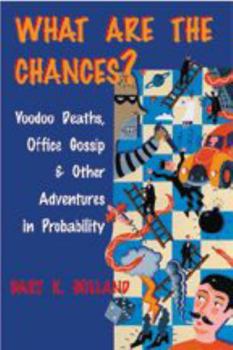What Are the Chances?: Voodoo Deaths, Office Gossip, and Other Adventures in Probability
Select Format
Select Condition 
Book Overview
Using examples drawn from daily life and history, the author explains what probability is and how it works. Our lives are governed by chance. But what, exactly, is chance? In this book, accomplished statistician and storyteller Bart K. Holland takes us on a tour of the world of probability. Weaving together tales from real life--from the spread of the bubonic plague in medieval Europe or the number of Prussian cavalrymen kicked to...
Format:Hardcover
Language:English
ISBN:0801869412
ISBN13:9780801869419
Release Date:June 2002
Publisher:Johns Hopkins University Press
Length:160 Pages
Weight:0.80 lbs.
Dimensions:0.7" x 5.8" x 8.8"
Age Range:18 years and up
Grade Range:Postsecondary and higher
Customer Reviews
2 ratings
Let's Figure the Odds
Published by Thriftbooks.com User , 22 years ago
It has been shown that although any branch of mathematics can be difficult, people have a particular inherent difficulty with probability. It's easy to see an example of this: Las Vegas was built upon the fantasy that one might walk away from the tables richer than one started. Of course, it can happen, but even the fools about to be parted from their money know that the odds are against them. It makes little difference. We think we have an intrinsic understanding of probability, but we do not. A little book by statistician Bart K. Holland, _What Are the Chances?: Voodoo Deaths, Office Gossip, and Other Adventures in Probability_ (Johns Hopkins University Press) could improve understanding of some simple and some difficult matters in the laws of chance.For instance, mathematicians evaluated the "Hot Hand" effect in basketball. Players and spectators knew that there were times when a shooter was having a good string of hits, an obvious run that demonstrated a flow of particular skill. But there weren't such runs; we are pattern-seeking creatures, and we can see patterns even in randomness, that is, when no pattern is there. What's more, we are very likely to think the pattern can be used as some sort of prediction. This is the basis of the classic "gambler's fallacy," that in a random indicator, what has gone before affects what will happen next. It "feels" right that if you toss a fair coin repeatedly and get ten heads in a row, that it is more likely that the next toss will be tails, but of course the coin has no memory of what has gone before. Probability plays a role in actuarial tables, and there is a brief, fascinating history of life insurance; it used to be sacrilegious to offer life insurance (but not, say, shipping delivery insurance) because only God was supposed to roll those dice. Holland also explains queuing theory basics, and answers the ultimate question: Why is my line for the supermarket check-out going so much slower than the others? The Voodoo deaths in the subtitle come from epidemiologic studies (Holland is a professor of biostatistics and epidemiology) which show that that patients who believe themselves marked by death for a voodoo curse are actually at greater risk for dying (or at least getting sick). It can be shown, however, that nothing supernatural is happening. The hex only works if the victim and his family know about it and believe the voodoo priest has the power to do such a thing; in other words, it has a reverse placebo effect. The office gossip in the subtitle is a model of exponential spread, analogous to the spread of the plague, or to a nuclear chain reaction. Holland has picked amusing examples, both esoteric and from everyday life, to illustrate the way probability profoundly affects all of us. Chances are that any reader will be entertained and educated.
A good collection of statistics applications
Published by Thriftbooks.com User , 22 years ago
I teach introductory business statistics, in addition to a variety of economics and finance courses at a regional campus of a state university. I was looking for some interesting, relevant applications/anecdotes to supplement a clearly written but rather terse textbook. I also wanted some new material to spice up my lectures. This book delivers. In principle, it can be read by someone who has never had a course in statistics, because it develops the subject from first principles, or should I say, first examples. In the course of the narrative, typical introductory textbook topics such as the nature of randomness, the binomial and normal probability distributions, and confidence intervals are covered. The exposition is self-contained, in that it includes mathematical expressions of the probability distributions. Unlike a textbook, however, it becomes clear that the examples drive the exposition of the statistics, not vice-versa. Some interesting examples require the development of distributions which are not generally taught in introductory courses, such the Poisson and even more advanced stochastic processes to model waiting times. No one but a mathematician will be able to completely absorb this advanced material, especially since it seems to be included more for completeness than with an expectation of comprehension by the reader. Also, as a financial economist, I was a bit disappointed by the treatment of random walks to model stock price behavior. While not generally incorrect, the exposition is not as lucid as if it had been written by, say, an econometrician. On the other hand, the main benefit I got from reading this book was a plethora of examples outside finance and economics--specifically, in epidemiology, which is the author's specialty. Although I would not recommend this book to anyone looking for a self-study textbook in the subject, I would highly recommend it for a student who is taking or has taken an introductory statistics class, as well as someone who is contemplating taking the subject and wants more motivation than a textbook will provide. Holland is a very erudite writer. After reading this book, nobody can legitimately claim that statistics is boring or irrelevant.






